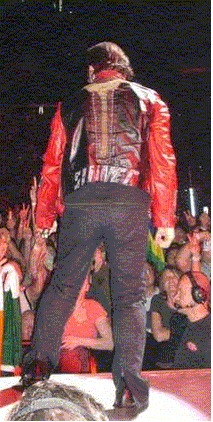Maybe some defintion could spare us.
___________________________________________
5 entries found for prophet.
proph·et ( P ) Pronunciation Key (prft)
n.
A person who speaks by divine inspiration or as the interpreter through whom the will of a god is expressed.
A person gifted with profound moral insight and exceptional powers of expression.
A predictor; a soothsayer.
The chief spokesperson of a movement or cause.
Prophets (used with a sing. or pl. verb) The second of the three divisions of the Hebrew Scriptures, comprising the books of Joshua, Judges, Samuel, Kings, Isaiah, Jeremiah, Ezekiel, and the Twelve. Used with the. See table at Bible.
Prophet One of the prophets mentioned in the Bible, especially one believed to be the author of one of these books. Used with the.
Prophet Islam. Muhammad. Used with the.
--------------------------------------------------------------------------------
[Middle English prophete, from Old French, from Latin prophta, from Greek prophts : pro-, before; see pro-2 + -phts, speaker (from phanai, to speak. See bh-2 in Indo-European Roots).]
--------------------------------------------------------------------------------
prophet
n 1: an authoritative person who divines the future [syn: oracle, seer, vaticinator] 2: someone who speaks by divine inspiration; someone who is an interpreter of the will of God
Source: WordNet ® 2.0, © 2003 Princeton University
prophet
(Heb. nabi, from a root meaning "to bubble forth, as from a fountain," hence "to
utter", comp. Ps. 45:1). This Hebrew word is the first and the most generally
used for a prophet. In the time of Samuel another word, _ro'eh_, "seer", began
to be used (1 Sam. 9:9). It occurs seven times in reference to Samuel.
Afterwards another word, _hozeh_, "seer" (2 Sam. 24:11), was employed. In 1 Ch.
29:29 all these three words are used: "Samuel the seer (ro'eh), Nathan the
prophet (nabi'), Gad the seer" (hozeh). In Josh. 13:22 Balaam is called (Heb.)
a _kosem_ "diviner," a word used only of a false prophet. The "prophet"
proclaimed the message given to him, as the "seer" beheld the vision of God.
(See Num. 12:6, 8.) Thus a prophet was a spokesman for God; he spake in God's
name and by his authority (Ex. 7:1). He is the mouth by which God speaks to men
(Jer. 1:9; Isa. 51:16), and hence what the prophet says is not of man but of God
(2 Pet. 1:20, 21; comp. Heb. 3:7; Acts 4:25; 28:25). Prophets were the immediate
organs of God for the communication of his mind and will to men (Deut. 18:18,
19). The whole Word of God may in this general sense be spoken of as prophetic,
inasmuch as it was written by men who received the revelation they communicated
from God, no matter what its nature might be. The foretelling of future events
was not a necessary but only an incidental part of the prophetic office. The
great task assigned to the prophets whom God raised up among the people was "to
correct moral and religious abuses, to proclaim the great moral and religious
truths which are connected with the character of God, and which lie at the
foundation of his government." Any one being a spokesman for God to man might
thus be called a prophet. Thus Enoch, Abraham, and the patriarchs, as bearers
of God's message (Gen. 20:7; Ex. 7:1; Ps. 105:15), as also Moses (Deut. 18:15;
34:10; Hos. 12:13), are ranked among the prophets. The seventy elders of Israel
(Num. 11:16-29), "when the spirit rested upon them, prophesied;" Asaph and
Jeduthun "prophesied with a harp" (1 Chr. 25:3). Miriam and Deborah were
prophetesses (Ex. 15:20; Judg. 4:4). The title thus has a general application
to all who have messages from God to men. But while the prophetic gift was thus
exercised from the beginning, the prophetical order as such began with Samuel.
Colleges, "schools of the prophets", were instituted for the training of
prophets, who were constituted, a distinct order (1 Sam. 19:18-24; 2 Kings 2:3,
15; 4:38), which continued to the close of the Old Testament. Such "schools"
were established at Ramah, Bethel, Gilgal, Gibeah, and Jericho. The "sons" or
"disciples" of the prophets were young men (2 Kings 5:22; 9:1, 4) who lived
together at these different "schools" (4:38-41). These young men were taught
not only the rudiments of secular knowledge, but they were brought up to
exercise the office of prophet, "to preach pure morality and the heart-felt
worship of Jehovah, and to act along and co-ordinately with the priesthood and
monarchy in guiding the state aright and checking all attempts at illegality
and tyranny." In New Testament times the prophetical office was continued. Our
Lord is frequently spoken of as a prophet (Luke 13:33; 24:19). He was and is
the great Prophet of the Church. There was also in the Church a distinct order
of prophets (1 Cor. 12:28; Eph. 2:20; 3:5), who made new revelations from God.
They differed from the "teacher," whose office it was to impart truths already
revealed. Of the Old Testament prophets there are sixteen, whose prophecies
form part of the inspired canon. These are divided into four groups: (1.) The
prophets of the northern kingdom (Israel), viz., Hosea, Amos, Joel, Jonah.
(2.)
The prophets of Judah, viz., Isaiah, Jeremiah, Obadiah, Micah, Nahum, Habakkuk,
Zephaniah.
(3.) The prophets of Captivity, viz., Ezekiel and Daniel.
(4.) The
prophets of the Restoration, viz., Haggai, Zechariah, and Malachi.


 no comments? I posted the pic because Bono's jacket says "sinner" on the back. I thought it was relative to the subject at hand, no?
no comments? I posted the pic because Bono's jacket says "sinner" on the back. I thought it was relative to the subject at hand, no?